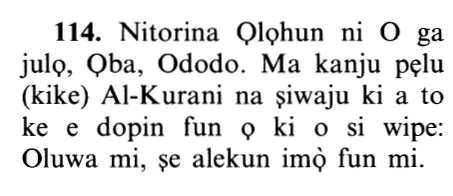20vs114
Select any filter and click on Go! to see results
فَتَعَالَى اللَّهُ الْمَلِكُ الْحَقُّ وَلَا تَعْجَلْ بِالْقُرْآنِ مِن قَبْلِ أَن يُقْضَى إِلَيْكَ وَحْيُهُ وَقُل رَّبِّ زِدْنِي عِلْماً
FataAAala Allahu almaliku alhaqqu wala taAAjal bialqurani min qabli an yuqda ilayka wahyuhu waqul rabbi zidnee AAilman
Index Terms
Click to play
Yoruba Translation

Hausa Translation
Sa´an nan Allah Mamallaki, Tabbatacce Yã ɗaukaka. Kuma kada ka yi gaggãwa(1) da Alƙur´ãni a gabãnin a ƙãre wahayinsa zuwa gare ka. Kuma ka ce: "Yã Ubangiji! Ka ƙãra mini ilmi."
Asbabu n-Nuzuul (Occasions of Revelation)
فَتَعَالَى اللَّهُ الْمَلِكُ الْحَقُّ ...
Then High above all be Allah, the True King.
This means: Most Holy and Majestic is He, the True King, Who is Himself the Truth and His promise is true. Likewise, His threat is true, His Messengers are true, the Paradise is true, the Hellfire is true and everything from Him is true. His justice is that He does not punish anyone before warning them, sending Messengers to them and granting excuses to His creatures, so that no one will have any argument or doubt (on Judgment Day).
The Command to the Prophet to listen to the Qur'an when it is revealed without making haste to recite it
Concerning Allah's statement,
... وَلَا تَعْجَلْ بِالْقُرْآنِ مِن قَبْلِ أَن يُقْضَى إِلَيْكَ وَحْيُهُ ...
And be not in haste with the Qur'an before its revelation is completed to you,
This is similar to Allah's statement,
لاَ تُحَرِّكْ بِهِ لِسَانَكَ لِتَعْجَلَ بِهِ
إِنَّ عَلَيْنَا جَمْعَهُ وَقُرْءَانَهُ
فَإِذَا قَرَأْنَـهُ فَاتَّبِعْ قُرْءَانَهُ
ثُمَّ إِنَّ عَلَيْنَا بَيَانَهُ
Move not your tongue to make haste therewith. It is for Us to collect it and to give you the ability to recite it. And when We have recited it to you, then follow its recital. Then it is for Us to made it clear (to you). (75:16-19)
It is confirmed in the Sahih on the authority of Ibn Abbas, who said that;
the Messenger of Allah used to go through great pains to retain the revelation. In doing so he used to move his tongue rapidly with its recital. Then, Allah revealed this Ayah. This means that whenever Jibril would say an Ayah, the Prophet would say it with him due to his eagerness to memorize it. Then, Allah guided him to that which was easier and lighter in this matter, to relieve him of this difficulty.
Allah said,
لاَ تُحَرِّكْ بِهِ لِسَانَكَ لِتَعْجَلَ بِهِ
إِنَّ عَلَيْنَا جَمْعَهُ وَقُرْءَانَهُ
Move not your tongue to make haste therewith. It is for Us to collect it and to give you the ability to recite it. (75:16-17)
Meaning, "We will gather it in your chest, then you will recite it to the people without forgetting anything of it.''
فَإِذَا قَرَأْنَـهُ فَاتَّبِعْ قُرْءَانَهُ
ثُمَّ إِنَّ عَلَيْنَا بَيَانَهُ
And when We have recited it to you, then follow its recital. Then it is for Us to made it clear (to you). (75:18-19)
And He said in this Ayah,
... وَلَا تَعْجَلْ بِالْقُرْآنِ مِن قَبْلِ أَن يُقْضَى إِلَيْكَ وَحْيُهُ ...
And be not in haste with the Qur'an before its revelation is completed to you,
This is a command to the Prophet to listen quietly: `Then, when the angel (Jibril) completes reciting to you, you recite it after him.'
... وَقُل رَّبِّ زِدْنِي عِلْمًا ﴿١١٤﴾
and say: "My Lord! Increase me in knowledge.''
meaning, "Give me more knowledge from You.''
Ibn Uyaynah said,
"The Prophet did not cease increasing (in knowledge) until Allah, the Mighty and Sublime, took him (i.e. he died).''
وقال في هذه الآية " ولا تعجل بالقرآن من قبل أن يقضى إليك وحيه " أي بل أنصت فإذا فرغ الملك من قراءته عليك فاقرأه بعده " وقل رب زدني علما " أي زدني منك علما قال ابن عيينة رحمه الله ولم يزل صلى الله عليه وسلم في زيادة حتى توفاه الله عز وجل ولهذا جاء في الحديث " إن الله تابع الوحي على رسوله حتى كان الوحي أكثر ما كان يوم توفي رسول الله صلى الله عليه وسلم " وقال ابن ماجه حدثنا أبو بكر بن أبى شيبة حدثنا عبد الله بن نمير عن موسى بن عبيدة عن محمد بن ثابت عن أبي هريرة رضي الله عنه قال : كان رسول الله صلى الله عليه وسلم يقول : " اللهم انفعني بما علمتني وعلمني ما ينفعني وزدني علما والحمد لله على كل حال " وأخرجه الترمذي عن أبي كريب عن عبد الله بن نمير به وقال غريب من هذا الوجه ورواه البزار عن عمرو بن علي الفلاس عن أبي عاصم عن موسى بن عبيدة به وزاد في آخره وأعوذ بالله من حال أهل النار " .
"فتعالى الله الملك الحق" عما يقول المشركون "ولا تعجل بالقرآن" أي بقراءته "من قبل أن يقضى إليك وحيه" أي يفرغ جبريل من إبلاغه "وقل رب زدني علما" أي بالقرآن فكلما أنزل عليه شيء منه زاد به علمه
لما عرف العباد عظيم نعمه , وإنزال القرآن نزه نفسه عن الأولاد والأنداد فقال : " فتعالى الله " أي جل الله الملك الحق ; أي ذو الحق .
I'raab - grammatical analysis of the Qur'an
«فَتَعالَى» الفاء استئنافية تعالى ماض مبني على الفتح المقدر «اللَّهُ» لفظ الجلالة فاعل «الْمَلِكُ الْحَقُّ» صفتان مرفوعتان والجملة استئنافية «وَلا» الواو عاطفة ولا ناهية «تَعْجَلْ» مضارع مجزوم بلا الناهية فاعله مستتر «بِالْقُرْآنِ» متعلقان بتعجل «مِنْ قَبْلِ» متعلقان بتعجل «أَنْ» ناصبة «يُقْضى » مضارع مبني للمجهول «إِلَيْكَ» متعلقان بيقضى «وَحْيُهُ» نائب فاعل والهاء مضاف إليه «وَقُلْ» الجملة معطوفة «رَبِّ» منادى بأداة نداء محذوفة وهو منصوب على النداء ومضاف إلى ياء المتكلم المحذوفة «زِدْنِي» فعل دعاء والنون للوقاية والياء في محل نصب مفعول به أول «عِلْماً» مفعول به ثان وجملة النداء والتي بعدها مقول القول
